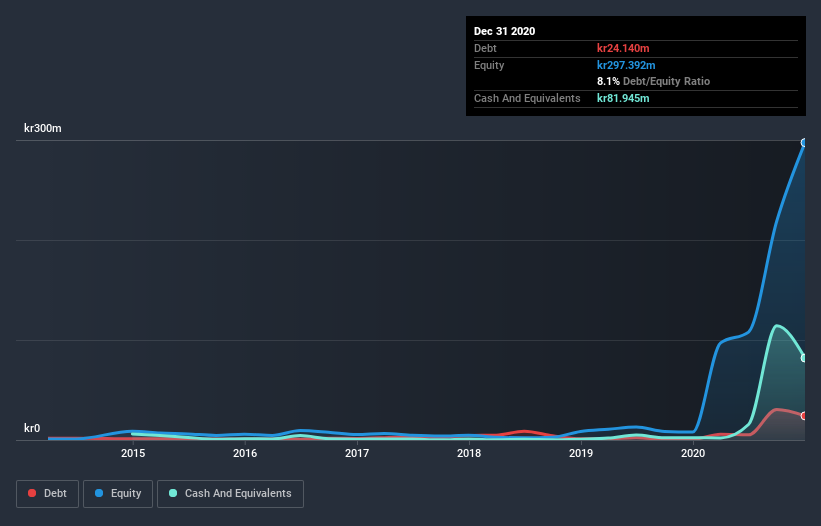
Legendary fund manager Li Lu (who Charlie Munger backed) once said, 'The biggest investment risk is not the volatility of prices, but whether you will suffer a permanent loss of capital.' When we think about how risky a company is, we always like to look at its use of debt, since debt overload can lead to ruin. We can see that Bayn Group AB (publ) (STO:BAYN) does use debt in its business. But should shareholders be worried about its use of debt?
When Is Debt Dangerous?
Generally speaking, debt only becomes a real problem when a company can't easily pay it off, either by raising capital or with its own cash flow. In the worst case scenario, a company can go bankrupt if it cannot pay its creditors. While that is not too common, we often do see indebted companies permanently diluting shareholders because lenders force them to raise capital at a distressed price. Of course, debt can be an important tool in businesses, particularly capital heavy businesses. The first step when considering a company's debt levels is to consider its cash and debt together.
Check out our latest analysis for Bayn Group
How Much Debt Does Bayn Group Carry?
The image below, which you can click on for greater detail, shows that at December 2020 Bayn Group had debt of kr24.1m, up from kr755.1k in one year. But on the other hand it also has kr81.9m in cash, leading to a kr57.8m net cash position.

How Strong Is Bayn Group's Balance Sheet?
We can see from the most recent balance sheet that Bayn Group had liabilities of kr124.2m falling due within a year, and liabilities of kr57.7m due beyond that. Offsetting these obligations, it had cash of kr81.9m as well as receivables valued at kr48.1m due within 12 months. So it has liabilities totalling kr51.9m more than its cash and near-term receivables, combined.
Having regard to Bayn Group's size, it seems that its liquid assets are well balanced with its total liabilities. So while it's hard to imagine that the kr3.15b company is struggling for cash, we still think it's worth monitoring its balance sheet. While it does have liabilities worth noting, Bayn Group also has more cash than debt, so we're pretty confident it can manage its debt safely. When analysing debt levels, the balance sheet is the obvious place to start. But it is Bayn Group's earnings that will influence how the balance sheet holds up in the future. So if you're keen to discover more about its earnings, it might be worth checking out this graph of its long term earnings trend.
Over 12 months, Bayn Group reported revenue of kr35m, which is a gain of 398%, although it did not report any earnings before interest and tax. When it comes to revenue growth, that's like nailing the game winning 3-pointer!
So How Risky Is Bayn Group?
We have no doubt that loss making companies are, in general, riskier than profitable ones. And we do note that Bayn Group had an earnings before interest and tax (EBIT) loss, over the last year. Indeed, in that time it burnt through kr250m of cash and made a loss of kr51m. Given it only has net cash of kr57.8m, the company may need to raise more capital if it doesn't reach break-even soon. The good news for shareholders is that Bayn Group has dazzling revenue growth, so there's a very good chance it can boost its free cash flow in the years to come. While unprofitable companies can be risky, they can also grow hard and fast in those pre-profit years. When analysing debt levels, the balance sheet is the obvious place to start. However, not all investment risk resides within the balance sheet - far from it. For instance, we've identified 5 warning signs for Bayn Group (3 can't be ignored) you should be aware of.
Of course, if you're the type of investor who prefers buying stocks without the burden of debt, then don't hesitate to discover our exclusive list of net cash growth stocks, today.
When trading Bayn Group or any other investment, use the platform considered by many to be the Professional's Gateway to the Worlds Market, Interactive Brokers. You get the lowest-cost* trading on stocks, options, futures, forex, bonds and funds worldwide from a single integrated account. Promoted
Valuation is complex, but we're here to simplify it.
Discover if Humble Group might be undervalued or overvalued with our detailed analysis, featuring fair value estimates, potential risks, dividends, insider trades, and its financial condition.
Access Free AnalysisThis article by Simply Wall St is general in nature. It does not constitute a recommendation to buy or sell any stock, and does not take account of your objectives, or your financial situation. We aim to bring you long-term focused analysis driven by fundamental data. Note that our analysis may not factor in the latest price-sensitive company announcements or qualitative material. Simply Wall St has no position in any stocks mentioned.
*Interactive Brokers Rated Lowest Cost Broker by StockBrokers.com Annual Online Review 2020
Have feedback on this article? Concerned about the content? Get in touch with us directly. Alternatively, email editorial-team (at) simplywallst.com.
About OM:HUMBLE
Humble Group
Humble Group AB (publ) refines, develops, and distributes fast-moving consumer products in Sweden and internationally.
Reasonable growth potential with acceptable track record.
Market Insights
Community Narratives




